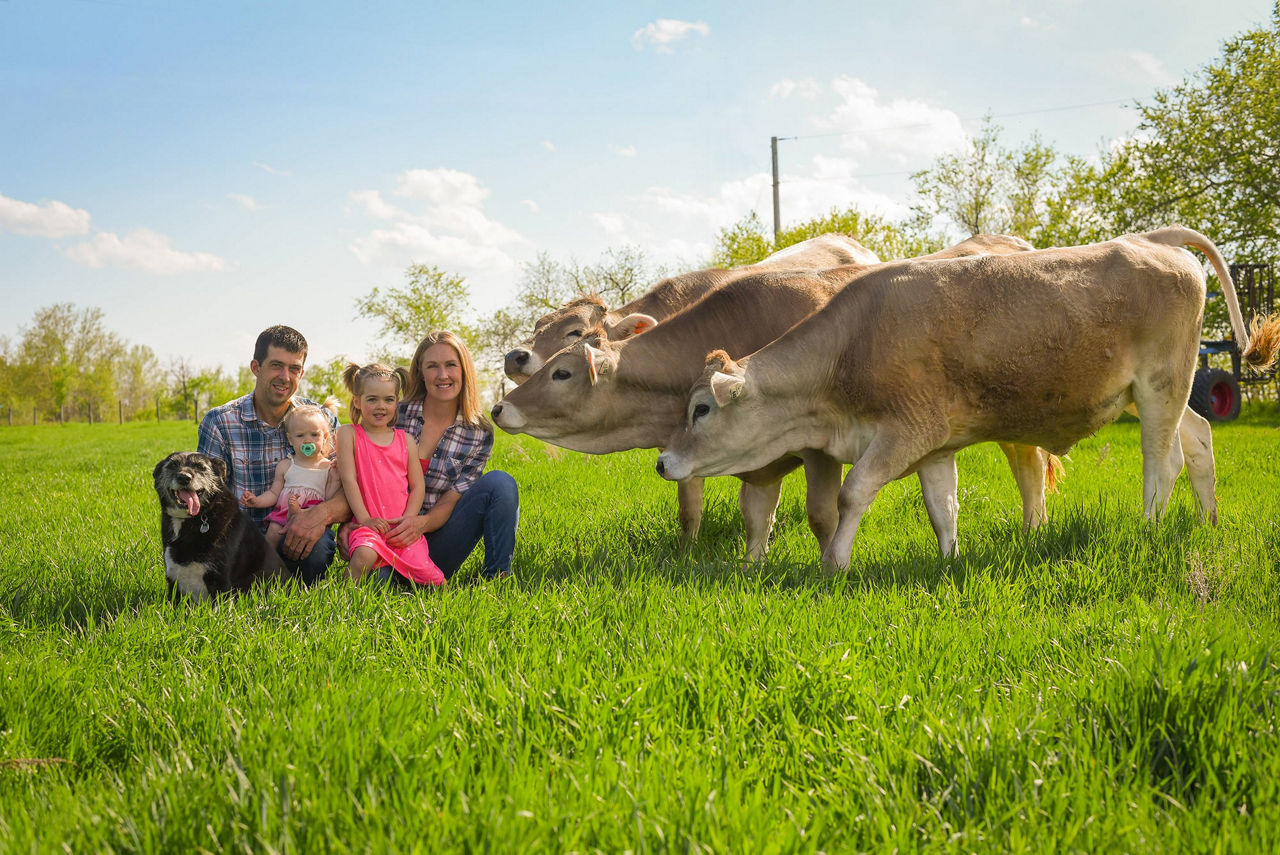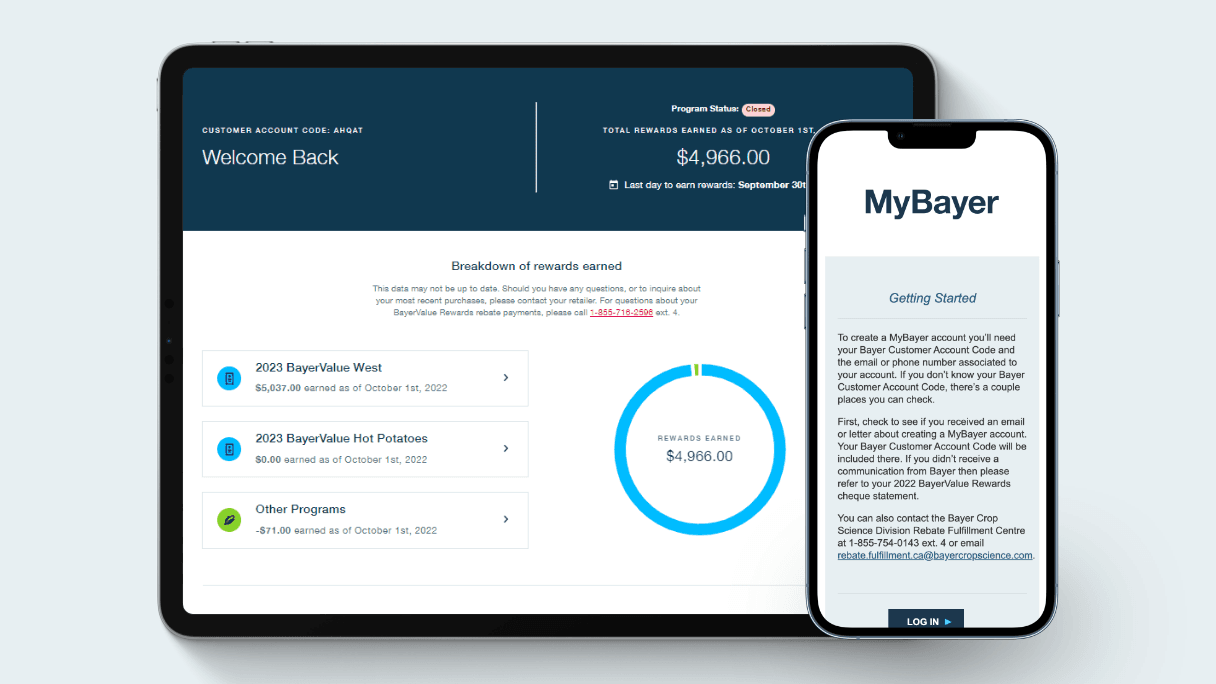An unconventional path to success.
April 16, 2025

By Dianne Finstad
Four Oak Farms in Kleefeld, Manitoba is utterly unique. A bold claim, but Marcus and Paige Dueck have chosen to shape their third-generation family dairy farm into a mold all its own.
For instance, they have about 900 acres of cropland, not the huge land base typical of the Prairies. They run a dairy, but milk Brown Swiss cows, not Holstiens. They use a robotic milker that goes to the cows, not the other way around. They produce hay that caters to the high-end horse market, not local livestock farms. And they turned manure management into off-farm consulting income.
In everything they do, every decision they make, the Duecks show it’s possible to make your way in agriculture by thinking laterally and maximizing resources. It comes with some risks, yes, but there are big rewards too.
New generation, new thinking
Marcus, a professional agrologist, was a sales associate with Marc Hutlet Seeds until deciding to farm full-time in 2009. His parents still actively farm but now leave the decision making to Marcus and Paige.
While Four Oaks Farm has long been a dairy, with some crops, the couple brought a new focus to the operation after both graduated with animal science degrees from the University of Manitoba.
When Marcus and Paige took over farm operations they split roles, allowing each to bring their individual expertise and interests into the business and shape it into something that succeeds in an unconventional way. “Paige manages the barn, and I manage the crop side of it. Though we both work together and help each other out, one person is managing (each specific area). It has worked really, really well for us,” says Marcus.
Why Brown Swiss?
Years ago, when on the purebred dairy show trail, Marcus’ mother fell in love with a Brown Swiss cow. That initial heifer sparked a whole herd conversion from Holstein to Brown Swiss, and the Duecks wouldn’t have it any other way.
“The big draw is, A — they’re adorable,” says Paige. “And B — their temperament is nothing like a Holstein — they’re very calm, very stubborn, and their calving ability is amazing.” Also, the breed’s hardiness is impressive. They have few health issues and then there are the perks of high butterfat and higher carcass weight.
Paige, who once worked for Dairy Farmers of Manitoba, and as a Canadian Quality Milk validator, has changed the focus of the 50-cow herd from show ring to performance, with bull selection and cow family improvement plans focused on butterfat production.
Right tech, right place
As their existing tie-stall barn was in great shape, the Duecks invested in adding a dry cow barn and improved manure management. But the biggest change they brought to the dairy was the addition of a robotic milker, and not just any robotic milker.
“We were looking at how we could continue to push the boundaries of what the barn could put out without having to hire people to milk,” says Paige.
More common in Eastern Canada, the Duecks have the only tie-stall robot in Western Canada, and it took some convincing to get a Quebec firm to sell it without local dealer support. To top it off, they ordered it just before COVID, so a planned trip to Quebec to see the robot in action turned into a video tour.
The Duecks say it is one of the best investments they’ve made. “Our milk production per cow, in the last five years, is probably 40 per cent more. It’s a big change,” says Marcus, adding that the dairy has received numerous milk quality and production awards.
High-value hay
Paige brought her love of horses (plus actual horses!) to the farm, along with her connections to that industry. While roughly half of the farm’s available acres go to cash crops, corn and soybeans, the other half is in hay production with a variety of offerings, from straight alfalfa to an alfalfa grass blend, to straight grass and grass blends. Their hay customer base is mostly performance horse owners, from racetracks to hobbyists, in both Canada and the U.S.
“We are always looking for the next new, neat thing that our customers like,” says Marcus, adding that they do things a bit differently than the rest of the hay market. “We cut our grasses when they are fairly young and have not headed out, which makes for really soft grass that’s also high in protein. Alfalfa was always the go to for the protein but customers seem to like the grass alternative.
Horse owners want small square bales but, at volume, that became labor intensive. Discussing baler woes with a neighbour who is from Holland, Marcus learned about a baler that can make eight individually tied 75-pound bales inside one 600-pound medium square bale. He tracked down the company, and two weeks later, his parent’s family holiday to Germany added a detour to check out the baler. They were impressed, did the deal and a month later the specialized machine was on its way to Manitoba.
After some effort explaining how the composite bale worked, his customers fell in love with it. “They still have those small bales with the convenience of being able to move them around with a 30-horsepower yard loader tractor,” says Marcus. “It’s really taken off in our horse market and they can only find it here because we’re the only ones that have it.”
The unique bailer also led to a unique farm hire. Marcus and his Dutch neighbour teamed up to hire the local Krone dealer mechanic who worked on the bailer. It’s a creative solution that provides both farms with on-tap preventive as well as specialized machinery maintenance for less downtime and smoother operations.
The opportunity in manure
The Duecks’ farm is in a municipality dense with intensive livestock, so manure and nutrient management is paramount. They established a consulting firm that uses soil testing and tissue sampling to design nutrient management plans for customers, as well as their own farm. They utilize split-applying nitrogen on their corn as one beneficial management practice.
“We can target the yield potential that’s there and not risk the leaching, the runoff and maybe the extra nitrogen in the field that the crop wasn’t able to use that year,” says Marcus. “So, it’s a huge sustainable aspect, because we’re really protecting the environment by only putting the nutrients there when we need it, but it also has an economic impact by not wasting money on fertilizer that we weren’t able to use.
“Sustainability is not just on its own,” he says. “It’s also paired with economic benefits. I think a lot of that gets overlooked. We have gains that we can make economically, but they’re also sustainable at the same time.”
The business approach of Four Oak Farms is all about the details. By knowing their capabilities, and not always following the conventional path, they achieve the most with what they have. That is what helped earn them the 2024 Outstanding Young Farmers Program award for the Manitoba region.
“If you want to stay small, profitable and improve your resource pool, then you just have to pay attention, stay on top of education and decision making in a timely manner,” says Paige. “That’s how we roll, every day.”
